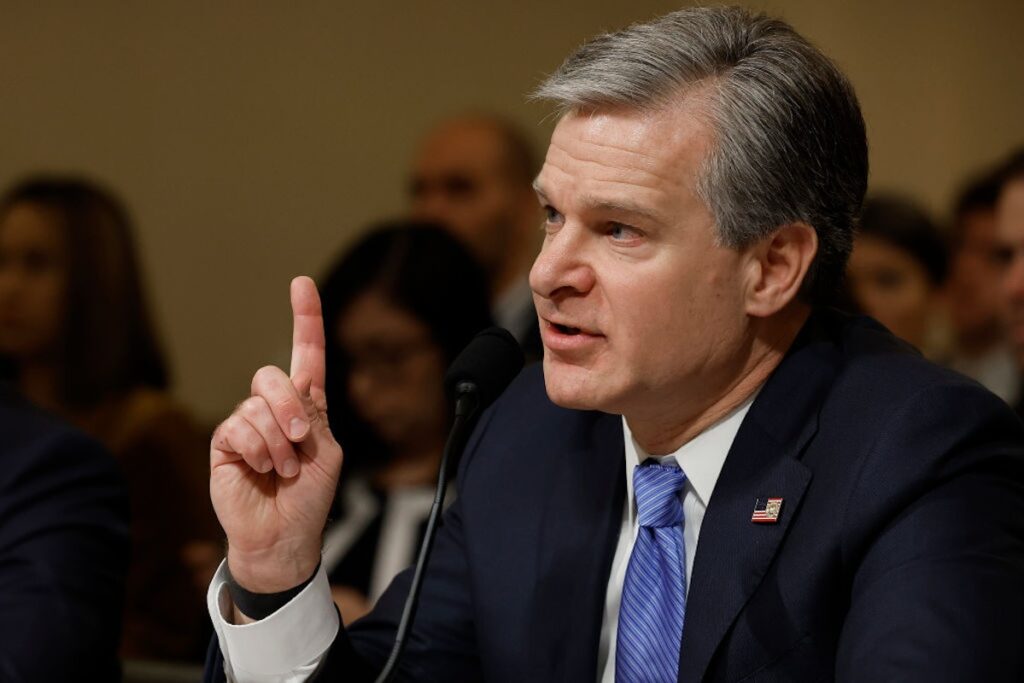The elusive nature of the term ‘disinformation’ has sparked a firestorm, with renowned independent journalist Glenn Greenwald, on Wednesday, aggressively criticizing FBI Director Christopher Wray for his inability to provide a concrete definition for the word during a recent House Judiciary Committee hearing.
“They did this under the guise that it was disinformation. Can you define what disinformation is?”
“What I can tell you is that our focus is not on disinformation, broadly speaking…”
Director Wray’s FBI is responsible for repeated 1A violations and he can’t answer for it. pic.twitter.com/3jChwqt3Rc
— Heritage Foundation (@Heritage) July 12, 2023
Rep. Mike Johnson (R-LA) confronted Wray with allegations of sustained First Amendment violations by the FBI and demanded clarity on the term that seemingly fueled these violations.
Johnson highlighted numerous instances where conservative-leaning dialogues were curtailed because of their alleged labeling as ‘disinformation.’ These instances included discussions on topics ranging from the contentious lab-leak theory of COVID-19’s origin, the effectiveness of masks and COVID-19 lockdowns, to the integrity of the 2020 presidential election and critiques about the economy. He accused the FBI of forcing social media platforms to remove such content if it emanated from conservative sources, under the pretext of combating ‘disinformation.’
The reason FBI Director Chris Wray can't define "disinformation" — even though that's the basis for the FBI's pressure campaign on Big Tech to censor Americans — is it's a bullshit, concocted term with no fixed meaning.
That's what gives it its power (like "terrorism"): https://t.co/Qhq6CNd2Qr
— Glenn Greenwald (@ggreenwald) July 12, 2023
Wray, however, dodged the question, asserting that the FBI’s focus was not on disinformation, broadly speaking. He insisted that they only addressed ‘disinformation’ stemming from ‘malign foreign actors’, but provided no solid definition for the term, a move that unleashed a torrent of criticism from Greenwald.
“The reason FBI Director Chris Wray can’t define ‘disinformation is it’s a bulls***, concocted term with no fixed meaning. That’s what gives it its power,” Greenwald fired back on Twitter. The journalist noted that the fuzziness of the term ‘disinformation’ – and its mercurial definition – was intentional and manipulative, designed to serve the interests of those in power.
Greenwald further contended that the FBI had a longstanding history as one of the leading disseminators of what one could define as ‘disinformation.’ He extended this allegation to corporate media and the so-called ‘disinformation experts’ that they have ordained. In a show of proof, he uploaded a tweet from former White House Press Secretary Jen Psaki. Psaki was part of a chorus within the Biden administration, the legacy media, and the intelligence community who branded the Hunter Biden laptop issue as ‘Russian disinformation’ — a claim that was later debunked.
However one defines "disinformation," it's beyond reasonable dispute that the FBI always has been, and continues to be, one of the most prolific disseminators of it.
The same is true of corporate media and the establishment frauds they've christened as "disinformation experts." pic.twitter.com/21MSZ6tw49
— Glenn Greenwald (@ggreenwald) July 12, 2023
This face-off between Greenwald and Wray has opened up a fresh debate on the weaponization of ambiguous terms like ‘disinformation’ by authorities and the potential implications for free speech. With a blatant absence of accountability and precision defining such pivotal terms, it’s clear that this issue requires serious consideration. How we use language and frame narratives has deep implications for liberty, transparency, and democracy.
Coming away from this confrontation, one can’t escape the pressing question – how is it allowable for a term as nebulous as ‘disinformation’ to continue playing such a pivotal role in decisions surrounding censorship, especially when the body applying the term cannot or refuses to define it? This query underscores the ever-growing demand for clarity, accountability, and ultimately, impartiality, in our dialogues and actions concerning censorship and free speech. An undefined term can’t be the basis of a fair, fact-based, and ultimately, just action.



